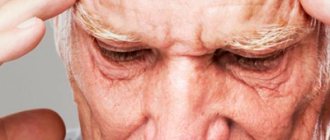Greetings, friends!
Each of us has at least once encountered such a state when we want absolutely nothing. There is no joy or sadness, the mood is simply “nothing”, and any good or bad news causes practically no emotions. This condition is called apathy. Sometimes it goes away without a trace after a good rest, and sometimes it can persist for months, preventing a person from living and working normally. Today we will look in detail at what apathy is, why it occurs, by what symptoms it can be identified and how to get rid of it. Let's begin.
What is apathy?
Apathy is a state manifested in total indifference to everything and a complete lack of motivation. A person immersed in this state loses interest in work, entertainment, relaxation and even communicating with friends. The term “apathy” is derived from the ancient Greek word “apatheia,” which translates as “passionlessness” (more meaningfully translated as “lack of passion for life”).
The key feature of apathy is that a person becomes equally indifferent to all areas of his life. He even reacts equally neutrally to both good and bad news.
In psychology, apathy is considered not as an independent diagnosis, but as a symptom of a number of other disorders and diseases. The causes of apathy vary, and in some cases you can get rid of it on your own, but sometimes you may need qualified help from a neuropsychiatrist.
Symptoms of pathology
Complete apathy towards life is manifested by a number of characteristic signs. Sometimes people who are used to controlling their emotions do not show any signs that are noticeable to others, but this only aggravates the problem.
Apathy, the importance of which is often underestimated, is an illness that causes not only psychological symptoms, but also physiological ones. Patients often experience stool disturbances and sluggish digestive function.
Main symptoms of apathy:
- Lack of emotional reaction to what is happening. The person experiences weakness, lethargy and does not pay attention to anything.
- Constant desire to lie or sit in one position. It is sometimes very difficult for a sick person to get up in the morning. A lethargic state can accompany you throughout the day.
- Deterioration in appearance and well-being. Signs of apathy are complemented by a person’s indifference to hygiene, work and any activity. Even with passive behavior, the patient experiences symptoms of fatigue.
- Reluctance to make plans for the future, complete lack of any interests. Such people often withdraw into themselves; they practically do not communicate with anyone.
- Impaired memory and thought processes. It is very difficult to pull a person out of such a state.
The disease can lead to other concomitant pathologies. A disease such as apathy has a wide variety of symptoms. In some cases, the patient experiences attacks of aggression and irritation when another person tries to pull him out of his comfort zone. Based on the recommendations of the attending physician, other family members may participate in the process of stabilizing the condition.
The disease is especially difficult for people with cancer pathologies and those who suffer from chronic psychological illnesses. Most people are afraid to admit the symptoms of an apathetic state, because this indicates instability in the emotional sphere. Thus, they only aggravate the course of the disease.
Patients often experience low blood pressure. Such people tend to constantly sleep or doze. Any activity, even one that does not require effort, leads to fatigue. A person's house is in disarray. Against the backdrop of indifference, family conflict may occur.
If the disease is not paid attention to, it can lead to depression. At the same time, chronic diseases worsen. The gastrointestinal tract suffers, cerebral circulation is disrupted. Vegetative-vascular dystonia may occur.
Signs of apathy
Apathy is quite noticeable from the outside, especially if you have known the person for a long time. Having immersed himself in this state, he behaves more detached, passive and indifferent. Please note that every person periodically behaves more calmly and phlegmatically (how is that?) than usual. But in a state of apathy, there is a noticeable lack of interest in many significant things. A person no longer strives to exchange emotions; it is as if the need for love and communication disappears. Relatives often take this personally and are offended by the person for paying much less attention to them.
You can determine the presence of apathy in yourself or a friend by the following signs:
- poor health, lack of strength, constant fatigue, drowsiness;
- lack of interest in everything, a rather indifferent reaction to good and bad events;
- solitude, reluctance to go out and communicate with friends;
- slow response to an appeal (the person does not answer immediately or does not answer correctly);
- slow, monotonous, almost completely emotionless speech;
- lack of desire to take care of oneself (a person ceases to pay due attention to hygiene, appearance, health);
- “nervous” habits (foot tapping, hand rubbing, finger snapping, etc.).
Visual changes in the patient's appearance
A person suffering from psychological changes even visually causes fear among others. If, for example, a situation is provoked in the person under study where any emotions are evoked in a normal, healthy individual, the person predisposing to apathy will not show his anger, sadness or irritation in any way. Sometimes, if you ask him questions, he will ignore them in every possible way, or answer in very simple words, making up monosyllabic sentences.
More severe disorders are expressed even in a person’s posture. The patient's head droops, his gaze is lifeless, his reactions to any stimulus are slow or simply absent. There is no emotional coloring of the speech; complete indifference can be traced in any story.
When simulating a situation in which a normal person would show anxiety, the patient with apathy omits absolutely any reaction, does not change at all in his face or gestures, and completely controls his speech. Sometimes such patients withdraw into themselves, begin to look at their limbs for a long time, and perform monotonous actions with their fingers or feet, for example, tapping them.
Causes of apathy
In most cases, people attribute apathy to fatigue or bad mood, but the list of its causes is much wider. The most significant factors are:
1. Anxiety
. The human psyche is fragile and vulnerable, so it has developed certain protective mechanisms. And one of these mechanisms is ignoring too strong stimuli. Therefore, excessive anxiety can lead to apathy simply because the brain is trying to reduce stress levels.
How to get rid of apathy?
If you correctly understand what apathy is, then you already know that it is an undesirable state that does not lead to anything good. Of course, sometimes it occurs for natural reasons - this is the body’s way of signaling to us that we just need to take a break from everything. But in most cases it is better to get rid of it as soon as possible. Obviously, the most effective remedy against apathy caused by fatigue is good rest.
It is better to choose some moderately active pastime , for example, relaxing by a pond or in the village. Passive relaxation on the couch won't help much here. Too much load is also ineffective, but 1-2 days can be devoted to playing badminton or volleyball. The main thing is that after intense physical activity you have at least a couple of days left for the body to recover.
The main rule during the entire vacation is to completely protect yourself from work and from most everyday activities. Therefore, it is better not to consider vacationing at home or near home at all - go to the village, to the sea, to the lake, to the forest or to any other accessible place. You need to spend at least a few days in a “foreign” environment, with full awareness that work and everyday bustle are far away.
It is important to consider that apathy is a fairly advanced crisis state. It arises for various reasons, but almost always we are talking about a large pile of problems accumulated over many months. Therefore, it is impossible to get rid of apathy in 1 day , even if it is the best and most eventful vacation of your life. If the cause of this condition is fatigue, a long vacation is necessary. If the causes of apathy are hidden more deeply, the help of a psychotherapist may be required.
Of course, you need to start treating apathy with good rest. In order for it to be of sufficient quality and effectiveness, the following requirements must be met:
- You need to rest quite actively, but without exhausting yourself with heavy physical activity. Walking, swimming, active games, hiking, outdoor recreation are great options. If, instead of having a good rest, you go to the dacha and dig up a garden, this can only worsen the state of apathy, even if such an activity gives you pleasure.
- You need to rest as far as possible, ideally in a new and completely unfamiliar place. Your brain must understand that work, problems and everyday hustle and bustle are far away and are now inaccessible to it. This is the only way to completely get rid of unnecessary worries and relax for a good rest.
- While on vacation, try to sleep at least 8 hours every day. Keep in mind that lack of sleep and oversleeping are equally harmful to health and well-being.
- Try to minimize the amount of alcohol. Perhaps sometimes it really helps to relax better and throw problems out of your thoughts. But its detrimental effect on health will ultimately greatly impair the quality of your rest.
- Forget about work and problems altogether. Make sure that nothing makes you think about the things you are trying to take a break from. All issues at work should be resolved, there should be no “tails” that can weigh on you. Ask colleagues or subordinates not to call you unless absolutely necessary.
Of course, the more time you spend relaxing, the better. But even if you only have a week, this is enough to have a good rest and “reset” your thoughts. But the fight against apathy will need to be continued even after returning from vacation. To do this, always observe the following principles:
- Remember that the optimal sleep duration is 7-8 hours. Less sleep is not enough for good rest, but if you sleep more than 8 hours, the quality of sleep deteriorates greatly.
- Have breakfast every morning and watch your diet. Your energy depends on the quality of your diet, as well as the timely supply of nutrients to your body.
- Create a schedule and stick to it. Typically, people who avoid schedules feel like it limits personal freedom and takes up a lot of time. In practice, it turns out the opposite: people who live according to a schedule usually manage to get more done and have several hours of free time every day that can be spent on anything.
- Eliminate irritants. We constantly put up with unpleasant little things, without thinking that some can be eliminated altogether. Try to eliminate from your life everything that throws you off balance. Is the sun shining in your eyes at the office? Find a way to close it (stick a poster on the desired part of the window, if your bosses don't mind). Remember that every irritant can be eliminated or weakened. For example, if we are talking about a damaged relationship with a colleague, you can make peace (for example, using the advice of Dale Carnegie) or simply stop attaching importance to this confrontation.
If you have had a good rest and taken care to improve your living and working conditions, but the apathy does not go away, you need to contact a neuropsychiatrist. This is a specialist whose profession involves knowledge of psychology and neurology. His competence includes mental health disorders associated with diseases and organic lesions of the nervous system.
Development in pregnant women
For women carrying a child, there is an interesting moment when complete indifference sets in. Emotional and physical overload during this process is the main root cause of disease.
When a pregnant woman has all the endocrine glands of the body begin to work differently, in accordance with the increase in the amount of hormones, the emotional state changes significantly.
It is even possible to have an exaggerated assessment of the manifestations of the external world, which gives rise to illness. The psychological state of the expectant mother is also a very important aspect that contributes to the full bearing of the child. Often, women who were previously engaged in very active activities, but are now in a kind of depressed state, are more predisposed to the occurrence of such an illness, because there is no way to 100% realize their vital energy. After a woman finds out about her pregnancy, she realizes that she will not be able to engage in her usual activities.
Best materials of the month
- Coronaviruses: SARS-CoV-2 (COVID-19)
- Antibiotics for the prevention and treatment of COVID-19: how effective are they?
- The most common "office" diseases
- Does vodka kill coronavirus?
- How to stay alive on our roads?
Philosophical reflections about the meaning of life, bearing a child, prospects, can turn into the root cause of the disorder. This disease cannot be ignored in case of pregnancy - apathetic symptoms as they progress put the woman in a dangerous state.









